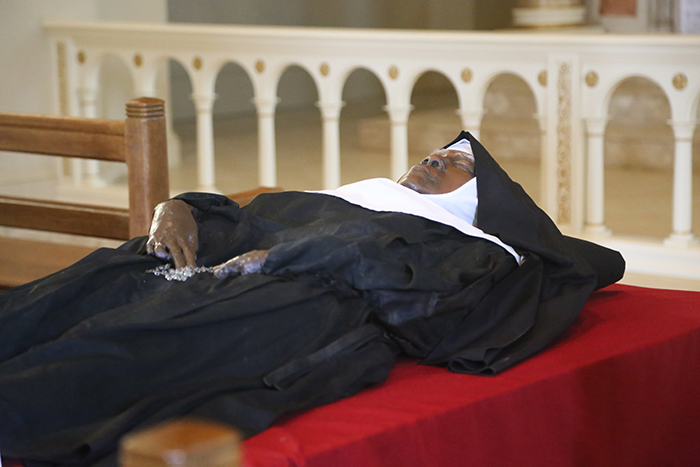
WASHINGTON — Hundreds of people daily are visiting a Benedictine monastery in a rural area north of Kansas City, Missouri, to witness what many are calling a “Miracle in Missouri” — a nun’s exhumed body that shows no signs of decay.
The Benedictine Sisters of Mary, Queen of Apostles in Gower, believe that their foundress, Mother Mary Wilhelmina Lancaster of the Most Holy Rosary, is the first African American woman to be found incorruptible, meaning her body did not compose. The sisters made this discovery May 18 after exhuming her body so it could be moved to an altar inside the monastery’s chapel. Sister Wilhemina died four years ago at age 95.
When the sisters had the nun’s wooden coffin dug up, they expected to find bones but instead found an intact body even though it had not been embalmed.
A fact sheet from the sisters about Sister Wilhemina’s body said: “Not only was her body in a remarkable preserved condition, her crown and bouquet of flowers were dried in place; the profession candle with the ribbon, her crucifix, and rosary were all intact.
“Even more remarkable was the complete preservation of her holy habit, made from natural fibers, for which she fought so vigorously throughout her religious life. The synthetic veil was perfectly intact, while the lining of the coffin, made of similar material, was completely deteriorated and gone,” the sisters noted.
Sister Wilhelmina’s remains are now cleaned and protected with wax. After a May 29 rosary procession, her body will be encased in glass. The sisters announced that once a devotion to the nun becomes well established, her cause for canonization may be introduced.
A devotion is certainly already underway. Once word spread on social media about the discovery of her undecayed body, people began coming in droves to see this for themselves and to pray that the nun would intercede for them.
The contemplative order’s website has a message right at the top of the homepage about current visitors to the monastery, the Abbey of Our Lady of Ephesus.
“For all those inquiring about visiting Sister Wilhelmina, please know there are thousands of people coming. If you are willing to wait in line, please bring folding chairs and umbrellas for shade if desired. There may be some food available on the grounds, but it is not guaranteed.”
It also says visitors may be at the monastery from 8 a.m. to 8 p.m. but would need to leave immediately after compline, or night prayers.
“Please note that you will still be able to see Sister’s body and touch relics of her habit and take dirt from her grave after the morning of the 29th, at which point she will be placed in the glass shrine in our church,” the message added.
Sister Wilhemina, who had been a member of the Oblate Sisters of Providence, the first congregation of black women religious in the United States, served as a teacher, musician, and historian but later in life she felt the call to a more contemplative lifestyle and the traditional Latin Mass.
She left the Oblates and founded the Benedictine community in 1995 when she was 70. The sisters were initially based in Pennsylvania and affiliated with the Priestly Fraternity of St. Peter, and then they were invited to the Diocese of Kansas City-St. Joseph where they moved in 2006.
The order’s sisters live their days primarily in silence, except for prayers and chanting of the Mass and Divine Office. In recent years they gained national attention, and new recruits, from making chart-topping albums of Gregorian chants.
The sisters also sew vestments for priests around the world and have a particular devotion to praying for them.
And now, the renewed attention to the order is the possibility that they have a potential saint in their midst. The Catholic Church has many incorruptible saints but being incorruptible isn’t necessarily a sainthood guarantee.
A May 22 statement from the Diocese of Kansas City-St. Joseph, said: “The condition of the remains of Sister Wilhelmina Lancaster has understandably generated widespread interest and raised important questions. At the same time, it is important to protect the integrity of the mortal remains of Sister Wilhelmina to allow for a thorough investigation.
“Incorruptibility has been verified in the past, but it is very rare. There is a well-established process to pursue the cause for sainthood, but that has not been initiated in this case yet,” it said.
The statement noted that Bishop James Johnston of Kansas City-St. Joseph “is working to establish a thorough process for understanding the nature of the condition of Sister Wilhelmina’s remains” and he invited the faithful to “continue praying during this time of investigation for God’s will in the lives of the Benedictines of Mary, Queen of Apostles; for all women religious; and all the baptized in our common vocation to holiness.”
